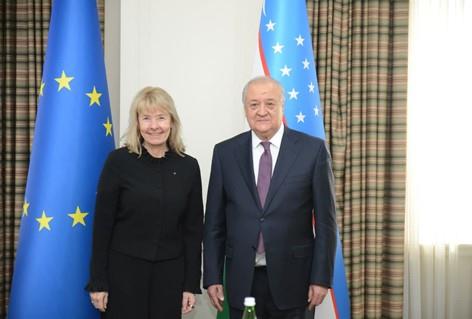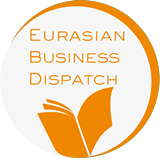Intervista all’amb. Terhi Hakala, rappresentante speciale UE per l’Asia Centrale (di Fabio Indeo)

Following your first trip to Central Asia, how would you assess the perspectives of a solid and multifaceted regional cooperation and which role could the EU play to promote it?
Since I started in July, I have now visited four out of five Central Asian countries, some of them several times already. I plan to visit Turkmenistan in the near future as well. In all countries, I met with a wide range of interlocutors from the senior level government officials to the civil society representatives. I participated in both high –level events on such topics as connectivity, water and environment. I attended the EU – Central Asia Civil Society Forum and we will hold the EU – Central Asia Economic Forum in November, both organised under the auspices of my office. From all of my interactions I conclude that there is great interest to continue and where possible strengthen the interaction with the European Union. The EU is seen as a reliable partner in the processes of reform and modernisation and in helping address old and new challenges both globally and locally.
There is a solid basis for cooperation with the Central Asian countries, which has been laid out in the EU Central Asia Strategy adopted in June 2019. It is titled “The EU and Central Asia: New Opportunities for a Stronger Partnership” which I think speaks for itself in terms of where we see our relationship going. The EU –Central Asia Strategy focuses in three aspects of our relationship: partnering for resilience, partnering for prosperity and working better together.
In a few words, the aim of partnering for resilience is to anticipate and address the challenges affecting the socio-economic goals and security and to enhance their ability to embrace reform and modernisation. Here we speak about democratic principles, human rights and the rule of law, implementation of the Paris commitments and tackling trans-regional environmental challenges, as well as stepping up cooperation on migration.
Partnering for prosperity focuses on unlocking the significant growth potential by fostering the development of a competitive private sector and promoting a sound and open investment climate and intra-regional trade and connectivity. As the Central Asian countries have a growing young population, it is important that we also support the development of skills and education as well as research and innovation.
Finally, we want to promote a coherent approach to Central Asia by EU institutions and member states, enhance cooperation in multilateral and regional fora, and engage more closely with civil society, think tanks, local governments, the business sector, social partners, cultural organisations, academics and youth. Public diplomacy is also an important feature of our cooperation.
The COVID 19 pandemic and the developments in Afghanistan have had an impact on the initial plans for the implementation of the strategy, but it still remains relevant even though we have to re-prioritise certain issues, mainly related to health and security.
How the EU Special Representative for Central Asia aims to further involve Central Asian academic sector, think-tanks and research centers to better implement EU initiatives in the region?
Engaging with the academic sector, think tanks and research centers is part of the implementation of the EU Central Asia strategy as I have outlined in the previous reply. Representatives of the academic sector, think tanks and research centers were actively involved in the preparation of the EU – Central Asia Strategy. I am convinced that as a result of this consultative process when we all put our heads together to analyse trends and challenges and possible ways to respond, the Strategy remains a relevant guiding document despite a number of unexpected events such as the COVID 19 pandemic, for example.
The main avenue for engagement for myself and my office is through the regional EU – Central Asia Civil Society Forum which takes place annually. It is a significant event that brings together a few hundred participants from both the EU and Central Asia, representing grassroots civil society, the private sector, researchers, media, as well as the governments (expert level). The preparation of the Forum, selection of topics and participants involves a series of consultations, including with the academic and research community. For example, this year we had an opening panel which brought together an EU academic, a think tanker from a Central Asian country and a human rights lawyer to discuss the implementation of the EU – Central Asia Strategy. It was a very dynamic discussion, albeit critical of the EU, but on the EU side we noted a few interesting recommendations.
We always count on the academic and think tank community to help us identify new opportunities, find innovative ways to work on these opportunities as well as increase the understanding of the EU and its visibility in the region. So these are all areas I look forward to cooperate on. I have only been on the job for a few months, and already see how busy my schedule will be in the next months, however, I always try to find time to engage with the academic and think tank community, support and promote their work whenever I can.
Just to give one interesting example on how we have worked with the academic community in the past. During the German Presidency, a German think tank together with its Central Asian partners developed interesting policy ideas about the youth pillar of the EU – Central Asia Strategy, my predecessor Ambassador Peter Burian engaged with the authors regularly to weave the recommendations into the policy process.
My team, of course, follows closely research and alerts me to interesting publications. I would, however, like to see more research and recommendations on current topics and issues from researchers on the ground, in particular.
On a broader scale, it would be important to increase the numbers and diversify the profile of Central Asian beneficiaries of the Horizon, Erasmus + and Marie Sklodowska-Curie programmes. Our mobility programmes offer opportunities to university students, teachers and researchers, while cooperation projects can also benefit institutions and policy-makers too. Each Erasmus+ project for capacity-building in higher education are made up of a partnership of European and Central Asian universities working together on new teaching, staff training, university governance or higher education reform to benefit the higher education sector – and the role that it can play in developing skills for the future.
The two-way mobility funded by Erasmus+ can improve mutual understanding of our two regions, by bringing Central Asian to Europe, and by Central Asian universities hosting European students and staff. While this is grounded in academic exchange, it is a powerful channel for increasing mutual understanding of our two regions, which can help increase the community of Central Asian students and teachers who understand how the EU and its Member States work, understand their values and principles, and their history and development. At the same time it is also important to interest more young people and teachers in Central Asia, to increase and deepen our knowledge about the region and each country. The EU offers these opportunities through its Erasmus+ programmes for students, teachers and youth.
These exchange and mobility projects are funded through annual calls for proposals. You can learn more about these calls on the Erasmus+ website, or by visiting the National Erasmus+ Office which exists in each of the Central Asian countries.
www.erasmusplus.kz www.erasmusplus.kg http://erasmusplus.tj/ http://www.erasmusplus.org.tm www.erasmusplus.uz
How the EU role in Central Asia has changed between the first and the current EU Strategy towards Central Asia? In which fields and sectors you could identify progresses? Which are the weaknesses
One cannot speak only about the role of the EU changing. There were significant developments in the region, which brought about the necessity of drafting another strategy. If one compares two strategies, one can see both continuity of our policies on issues such as human rights and the rule of law, economic development, business and investment, security and energy. At the same time, the EU became a stronger foreign policy player, developed or enhanced its own strategies on its role as a foreign and security policy actor in the global affairs, on connectivity, on Afghanistan among others. As the relationship matured, Central Asian countries became more interested in the EU as a leading player in climate change mitigation, connectivity or green economy and as an actor that could also help in the reform and modernisation processes, also as they started to work closer as a region, the agenda expanded. More concretely from the first to the second strategy, I see enhanced cooperation in the field of security, connectivity and climate change.
Since the adoption of the second Strategy, the Enhanced Partnership and Cooperation Agreement (EPCA) has entered into force with Kazakhstan and EPCAs are under negotiations with the Kyrgyz Republic and Uzbekistan. Negotiations are in the pipeline also for Tajikistan. In this respect, I see new dynamism in the relations between the EU and Central Asian countries.
There has been criticism of the new strategy as a “christmas tree” which includes everyone’s wishes, however, it outlines many issues on which we can work together at different speeds depending on the mutual interest and availability of funds. As you know the EU works mainly political dialogue and programming. The Strategy guides both the political engagement and programming. COVID 19 pandemic has shown that the EU institutions and the member states need to pull our resources as Team Europe if we want to address the challenges that face us, including in Central Asia.
I see progress in a number of areas, fields and sectors. Two I have already mentioned – the increasing role of the EU as a trusted partner and in regional cooperation. There is a growing understanding that major challenges that the region faces such as climate change, environmental disasters such as the disappearance of the Aral Sea or economic development cannot be addressed by one country alone and a regional approach is required from both the countries themselves and their partners. If you read the statement of the Heads of State following their regional Consultative meeting in Avaza this August, it talks about issues, which are similar to the EU – Central Asia agenda. In addition, many external players started to see Central Asia as a region – all the major players in the region now have their own C5 +1 formats even though bilateral cooperation might still be a preferred way of dealing with these countries.
Many challenges were also exacerbated by the COVID 19 pandemic in areas such as shrinking space for the civil society, governance and economic cooperation. With a number of dialogues, including on human rights, these issues are also part of our agenda. I believe that the EU’s strong commitment to stable, resilient and prosperous Central Asia is key to pursuing EU’s interests in the wider region.
Is the EU ready to cooperate with Russia and China – as well as with Central Asian republics – to deal with Afghanistan dossier, developing dialogue to prevent security and stability threats in the region?
The EU is greatly concerned about the humanitarian and socio-economic situation in Afghanistan. The international community, predominantly western countries, is mobilising support, including a 1 billion euro Afghanistan Support package from the EU. The EU places great emphasis on the role of Afghanistan’s neighbours with regard to the unfolding crisis in Afghanistan. The developments in Afghanistan have the potential to affect the region and beyond, and is therefore an important priority for the EU. I am in regular dialogue with my counterparts working on Afghanistan in Central Asian countries. We have many concerns in common such as preventing the spread of terrorism and radicalisation, trafficking in drugs, weapons and human beings, illegal migration and managing the refugee flows.
Also the EU aims to establish a regional dialogue with the immediate neighbours to discuss the situation in Afghanistan and ways to tackle it, as was highlighted in the Council Conclusions from 21 September 2021. Following it, the EU has reached out to several regional stakeholders in relation to Afghanistan and also recognises the importance of Russia and China in this regard. The situation in Afghanistan is a concern to the international community as a whole, we should collaborate as much as possible.
Articolo pubblicato originariamente nella newsletter "Matrioska" del Centro Studi Geopolitica.info
Fabio Indeo
Fabio Indeo, PhD in Geopolitica, analista per NATO Defense College Foundation (Central Asia) e membro del comitato esecutivo dell'Osservatorio Asia Centrale Caspio. Dal 2014 Indeo è analista per Eurasian Business Dispatch.





